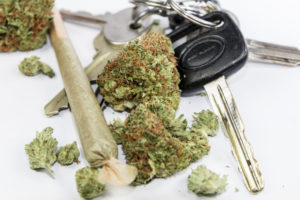SMELL OF MARIJUANA AND ADMITTING TO SMOKING MARIJUANA IS NOT ALONE ENOUGH TO ARREST FOR OVI
The Court of Appeals for the State of Ohio recently delivered an opinion stating that the admission of using marijuana prior to driving, coupled with little other evidence, is not enough to convict a defendant for Operating a Vehicle under the Influence of drugs or alcohol (OVI). State v. Kopp, 2017-Ohio-4428

DRIVER PULLED OVER FOR EXPIRED LICENSE, OFFICER SMELLS MARIJUANA, ARRESTS DRIVER AFTER FIELD SOBRIETY TESTS
In Kopp, the Defendant was pulled over when the arresting officer ran the license plate of the vehicle the Defendant was driving, and the report came back to an individual with an expired license. The officer made no other indication of another traffic violation prior to pulling the Defendant over.
The Defendant presented a valid license to the officer. The officer then noted a smell of marijuana, and the Defendant admitted to smoking marijuana “earlier.”
The officer then asked the Defendant to exit the car to perform field sobriety tests. He began with “standardized” field sobriety tests (the only tests that are admissible in court). If a driver shows four or more “clues” on any one standardized field sobriety test, it is considered a “fail.”
HGN (eye test) – The officer observed the driver’s pupils were dilated and observed two clues in the driver’s left eye. The officer acknowledged, however, that the driver “passed” the HGN test.
Walk-and-turn test – The officer observed three clues: the driver moved his feet to keep balance, stopped at one point, and turned incorrectly.
One-leg stand test – The officer observed two clues: the driver swayed while balancing and put his foot down.
He was considered to have “passed” the field sobriety tests because he showed less than four clues.
The officer then administered several non-standardized field sobriety tests.
While checking the driver’s eyes, the officer performed a “lack of convergence test” in which the driver was instructed to follow the tip of the stimulus (pen) with his eyes. The officer testified he watched whether the subject maintained eye contact with the stimulus and whether the eyes converged, or moved inward together, as the stimulus was moved counterclockwise inward toward the subject’s nose. The lack-of-convergence test is intended to provide clues if the subject is impaired due to marijuana. The officer believed the driver failed because his right eye did not converge and drifted out to the right twice.
Finally, the driver was able to correctly say the alphabet and to count backward from 69 to 57.
After completing all of these tests, the driver was arrested appellee for O.V.I.
In court, he filed a motion to suppress then evidence of the traffic stop.
NO PROBABLE CAUSE TO ARREST WHERE DRIVER PASSED STANDARDIZED FIELD SOBRIETY TESTS
A court must determine if a police officer had probable cause to arrest a devier for O.V.I. The court must determine that the officer had enough information, which would lead a reasonable person to believe that the driver was under the influence. State v. Homan, 89 Ohio St.3d 421
In Kopp, the Court stated, “the trial court concluded the [officer] had no probable cause to make the arrest.” The Defendant performed very well on field sobriety tests, and “exhibited no impaired driving; spoke to the officer calmly, politely, and intelligibly, exited the truck without incident.”
SMELL AND ADMISSION OF MARIJUANA USE CREATES REASONABLE SUSPICION FOR FIELD SOBRIETY TESTS; IS NOT ALONE ENOUGH TO CREATE PROBABLE CAUSE TO ARREST FOR OVI
The Prosecutor in Kopp argued that the smell of marijuana, the Defendant’s admission to smoking marijuana, and the Defendant’s failure of a non-standardized sobriety test (the lack of convergence marijuana test) should have been enough to create probable cause for the officer to arrest the Defendant for OVI.
The Court disagreed and made a distinction. The Court noted the smell and admission of marijuana created a reasonable suspicion of impaired driving, and authorized the officer to investigate further (i.e. search the car or ask him to perform field sobriety tests).
However, the smell of marijuana alone did not rise to the level of probable cause for arrest for OVI based on the fact that the driver did well on the standardized field sobriety tests, was calm and lucid in his interactions with the officer, and there was no traffic violation.
The Court explained that the Defendant
“was cooperative, respectful and provided a lucid explanation of the fact that his driver’s license was no longer suspended. While the totality of the circumstances does support a finding that the trooper had a reasonable, articulable suspicion upon which to base the administration of the field sobriety tests, [the driver] passed said tests and therefore we agree with the trial court that no probable cause existed as to the OVI.” State v. Kopp, 2017-Ohio-4428 citing State v. Cook, 5th Dist. Fairfield No. 06-CA-20, 2007-Ohio- 707.
OVI and Alcohol related offenses vary from case to case and there can be difficulty understanding what defenses may be available to you. It is important to contact an attorney who is knowledgeable about all possible defenses available to you, including whether the officer lacked probable cause to arrest you.
If you have questions about your Columbus DUI charges, talk to our Columbus DUI attorneys at 614-361-2804.



